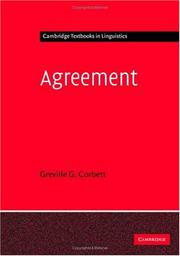| Listing 1 - 2 of 2 |
Sort by
|

ISBN: 9780521671569 9780521855471 0521855470 0521671566 9780511619830 9780511388842 0511388845 051138503X 9780511385032 0511387857 9780511387852 0511619839 1107176816 1281254479 9786611254476 0511386869 0511383169 9781107176812 9781281254474 6611254471 9780511386862 9780511383168 Year: 2008 Volume: 115 Publisher: Cambridge: Cambridge university press,
Abstract | Keywords | Export | Availability | Bookmark
 Loading...
Loading...Choose an application
- Reference Manager
- EndNote
- RefWorks (Direct export to RefWorks)
'Agreement' is the grammatical phenomenon in which the form of one item, such as the noun 'horses', forces a second item in the sentence, such as the verb 'gallop', to appear in a particular form, i.e. 'gallop' must agree with 'horses' in number. Even though agreement phenomena are some of the most familiar and well-studied aspects of grammar, there are certain basic questions that have rarely been asked, let alone answered. This book develops a theory of the agreement processes found in language, and considers why verbs agree with subjects in person, adjectives agree in number and gender but not person, and nouns do not agree at all. Explaining these differences leads to a theory that can be applied to all parts of speech and to all languages.
Grammar --- Grammar, Comparative and general --- Agreement --- 801.56 --- Syntaxis. Semantiek --- Congruentie (taalkunde) --- Agreement. --- 801.56 Syntaxis. Semantiek --- Congruentie (taalkunde). --- Agreement (Grammar) --- Concord (Grammar) --- Concord --- Case --- Gender --- Number --- Person --- Syntax --- Linguistics. --- Linguistic science --- Science of language --- Language and languages --- Arts and Humanities --- Language & Linguistics --- Linguistics --- Philology --- Grammar, Comparative and general - Agreement

ISBN: 9780521807081 9780521001700 0521001706 0521807085 Year: 2006 Publisher: Cambridge: Cambridge university press,
Abstract | Keywords | Export | Availability | Bookmark
 Loading...
Loading...Choose an application
- Reference Manager
- EndNote
- RefWorks (Direct export to RefWorks)
Agreement in language relates to the correspondence between words in a sentence, in terms of gender, case, person, or number. For example, in the sentence 'he runs', the suffix -s 'agrees' in number with the singular pronoun 'he'. Patterns of agreement vary dramatically cross-linguistically, with great diversity in the way it is expressed and the types of variation permitted. This clear introduction offers an insight into how agreement works, and how linguists have tried to account for it. Comparing examples from a range of languages, with radically different agreement systems, it demonstrates agreement at work in a variety of constructions. It shows how agreement is influenced by the conflicting effects of sentence structure and meaning, and highlights the oddities of agreement in English. The first textbook devoted to the cross-linguistic study of the topic, Agreement will be essential reading for all those studying the structure and mechanisms of natural languages.
Grammar, Comparative and general --- Agreement --- 801.56 --- Syntaxis. Semantiek --- 801.56 Syntaxis. Semantiek --- Accord (Linguistique) --- Agreement. --- Congruentie (taalkunde) --- Congruentie (taalkunde). --- Agreement (Grammar) --- Concord (Grammar) --- Concord --- Case --- Gender --- Number --- Person --- Syntax --- Comparative linguistics --- Grammar --- Grammaire --- Variation linguistique --- Linguistics --- Philology --- Grammar, Comparative and general - Agreement --- Accord (linguistique)
| Listing 1 - 2 of 2 |
Sort by
|

 Search
Search Feedback
Feedback About UniCat
About UniCat  Help
Help News
News